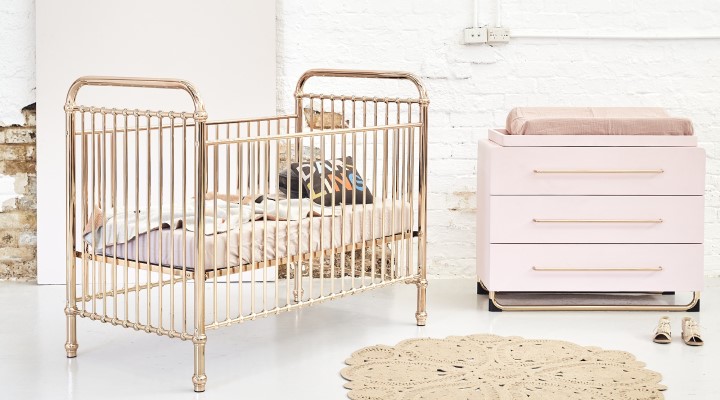Almost a year after Covid-19 prompted stay-at-home orders globally, ‘lockdown babies’ are filling up maternity wards around the globe. But retailers will be wondering whether the uncertain economic environment is likely to impact spending in the baby category, particularly at the higher end of the market. Bougie baby products have risen in popularity over the last 10 years, as Gen Y has entered parenthood. Brands such as Incy Interiors have capitalised on this boom wi
s boom with high-end products such as its ~$900 Rose Gold Ellie Cott creating a buzz on social media. Its popularity among mums further escalated since it was purchased by tennis star Serena Williams.
Christie Nicholas, chief growth partner at market research company Mumpower, attributes the rise in demand for premium baby products to more working mums, a lift in household income, and the fact that women are having less children.
And the pandemic has also had an impact on shopping behaviour in this niche category.
“Before the pandemic hit, we were seeing excessive consumerism in the baby products market; consumers were constantly looking for the next best thing and very willing to try new brands,” Nicholas told Inside Retail.
“There has been a shift in demand; some consumers are “buying up” to a more premium brand rather than budget brand as they are looking for something that lasts longer, while others that may have previously opted for even more higher end are downgrading to a less expensive, but still premium brand.”
2020 boom
Incy Interiors, an Australian company specialising in designer baby and children’s furniture, describe its customers as ‘mums with style’.
“[The customer base is] 95 per cent female, 25 – 40 professionals who want to create a beautiful home for their families,” founder Kristy Withers told Inside Retail.
While Withers admits 2020 was a strange year for the business, it was minimally affected by the pandemic.
“Now, more than ever, people are focusing on their homes and making them as stylish and practical as possible, this includes children’s bedrooms and playrooms. We saw a significant increase in sales [last] year, especially since lockdown.”
The strong demand for premium baby products last year was echoed by Nadean Richards, CEO of creative events and e-commerce company One Fine Collective. The business started out with weddings, under the brand One Fine Day, and later introduced a curated baby expo and e-commerce store known as One Fine Baby.
“Last year absolutely exceeded our expectations in terms of product sales on our e-commerce platform and new customers. We saw a huge boom in new users and expect the same to continue for 2021,” Richards told Inside Retail.
When the events industry came to an abrupt halt due to Covid-19, the business added the events product range to its e-commerce store and saw positive results.
“We also increased our preferred suppliers to ensure that everything on our platform is the best in the market,” she said.
Social influence
Unsurprisingly, social media has been a big driver of demand in the premium baby market. Consumers regularly turned to social platforms for entertainment and inspiration while stuck at home.
“Instagram sure has a lot to answer,” Richards said, pointing to “aspirational, yet real influencers”.
According to findings at Mumpower, mums, who are largely the decision makers of premium baby products, spend more time on social media than any other medium.
“They connect with others, they seek inspiration for their lives and they gather information all from social media,” Nicholas said.
Incy Interiors, eager to inspire through its social platforms, said the choice of platform differs depending on the customer segment.
“Teens/tweens look to TikTok and Snapchat whilst millennials are Instagram and Gen X and older, whilst using Instagram, also search for inspiration on Pinterest and Facebook,” she said.
Expectations for 2021
One Fine Baby is hoping that 2021 will allow the gradual return of more events, but is also focused on scaling and growing its e-commerce portfolio and building a reputation as a “trusted omnichannel platform” in the industry.
While demand for premium baby products is expected to remain strong, Nicholas said consumers are increasingly seeking value, and will lean towards compelling brands based on recommendations from other mums. These shoppers are also conducting even more research prior to buying to ensure they are making informed decisions.
“There will be more attention to purpose-driven, value-led companies. Plus consumers are more conscious of sustainable practices and materials being used,” she said.
Cultivating a more purpose-led business is a key part of the strategy at Incy Interiors.
“We have spent the last 12 months moving the business from a commercially-led business to a purpose-led business and we are so excited about what the future will hold,” Withers said.
Since launching in 2011, Incy Interiors has transitioned from a wholesale-based business model to a direct-to-consumer structure. Withers said this will change again over the next 12 months as the business launches into new markets with more of a wholesale focus.
While already present in several overseas markets, the company has further expansion plans in sight for 2021 – its 10th year in business.
“We really want to make it our best one yet. We have some really exciting collaborations and two new countries soon to be added to the mix.”

